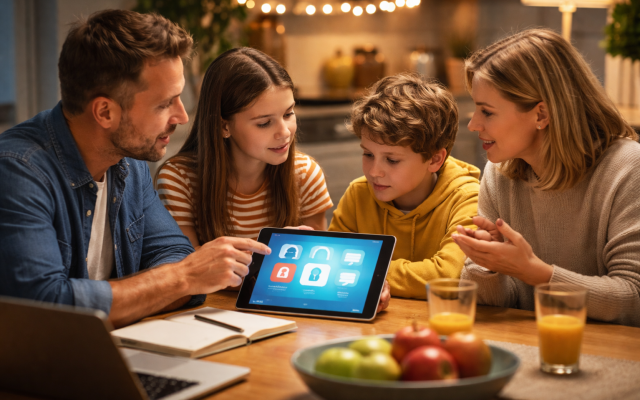6 min.
Alessandro is enrolled in class III A of the Circolo Didattico Iqbal Masih, but a type 2 spinal muscular atrophy forces him to stay at home for long periods of rest. Until now, the only tool Alessandro could use to attend his lessons was Skype along with the determination and help of the people around him, starting with his teacher, Mr. Luca Vitali. Alessandro’s plight was taken in hand by the Fondazione Mondo Digitale that evaluate the possibility of extending the E-Care project to schools. Finally, everything is ready. Ms. Elisa Amorelli, Press Officer for the Fondazione Mondo Digitale was present at the delivery of the technological devices to the school and family and listened to what the protagonists had to say. See the photo gallery
Project E-care, implemented thanks to an agreement undersigned by the Municipality of Rome, the Fondazione Mondo Digitale, the Paediatric Bambino Gesù Hospital and Intel Corporation Italia spa, allows children forced to stay at home or in hospitals because of long-term illnesses to attend courses via video-conference by using dedicated hardware and software.
E-Care: How the Project Works – See the Video
Simonetta Salacone, school administrator -
“Twenty years ago,” the Headmaster tells the students, “we had a young student with leukaemia who was forced to stay at home. It was very difficult to help her to continue her studies and send a support teacher to her house. Nonetheless, we managed and we managed to give her a good cultural background. Now, she attends high school and does very well. She is also much better physically and psychologically. It was really very difficult at the time … now we can all of this thanks to modern technology which provides a true opportunity to all of you growing up in today’s ICT society.
If used correctly this technology spells out success and can be used to help people. Our school has always employed technology to help children with disabilities and this is one of the reasons we have decided to participate in Project E-care. Naturally, the presence of specialised personnel is fundamental. Unfortunately, however, nearly half of the national support teachers still do not have a permanent contract. This means that they do not guarantee the continuity that these children require; often, they are only in class two hours a day. One of our objectives is to obtain a greater presence of these assistants that help to educate disabled students. Distance training is positive as it allows the subject to feel part of a group whilst providing him with the greatest autonomy. Moreover, all the student’s classmates can continue to communicate with the student at home or in the hospital and continue to create a community and grow together. These devices are a very useful tool, but they are not substitutes for a real education.”
Alessandro’s Mother -
“Above all, it’s the respiratory problems that force Alessandro to stay at home. When he starts coughing he needs to use a special machine. When he feels ill, I have to follow a precise procedure that I have become expert at. Alessandro’s school is a case of excellence in terms of the integration of disabled children. I believe that the E-care Project will provide even more help. We have already experienced courses via Skype: about a month ago, the teacher gave the children an assignment. The task was to correct grammatical errors in a text. I helped Alessandro, but unfortunately as soon as we had copied the text into Word, the software automatically corrected it!.”
Alessandro -
Alessandro sits close to his mother and holds the hand of his two-year-old brother Riccardo. He says he is happy about the PC that will allow him to interact with his friends in class and do his homework. Alessandro tells us that he is very good with computers and uses them to chat with friends, navigate the web and that starting from today he will also use a PC to do class work and follow his lessons.
Alessandro and his mother are members of the Associazione Famiglie Sma, an association of parents promoting research on spinal muscular atrophy. Alessandro’s mother has worked hard to allow the school to have dedicated infrastructures to help her son attend didactic activities. These include the installation of an electric lift to access the school theatre in a wheel chair.
Gianluigi Passaro, Alessandro’s Educational Assistant -
Gianluigi has taken care of Alessandro for three years ever since his first day at elementary school. He helps Alessandro with his physical and psycho-social issues from getting dressed to socialising with his classmates. Gianluigi provides 360° support that allows Alessandro to even participate in the gym class. “Alessandro’s health is very delicate. A simple cold can force him to stay at home. His manual dexterity is extremely limited and writing on a PC is of great help. Interactive education from home is a very positive experience. It allows the disabled students to keep up with schoolwork and keep in contact with his classmates. This is a fundamental aspect and I pay particular attention to it.”
Luca Vitali, teacher -
The presence of two individuals in class is fundamental. One manages the frontal lesson, while the other helps the disabled student, not only in class, but also at home. At present, if the disabled student is not in class, the assistant cannot work and is not paid. Public services must look into this and help us. The technological devices that are now available are also fundamental, but they require a human aid. Schools must have a greater number of teachers that know how to use this technology. At present, computer labs and other tools are not fully taken advantage of.
For further information:
The Project (pdf)
www.siamobravi.it - the web site of the Iqbal Masih School Grade 3 in the Learning Environment



